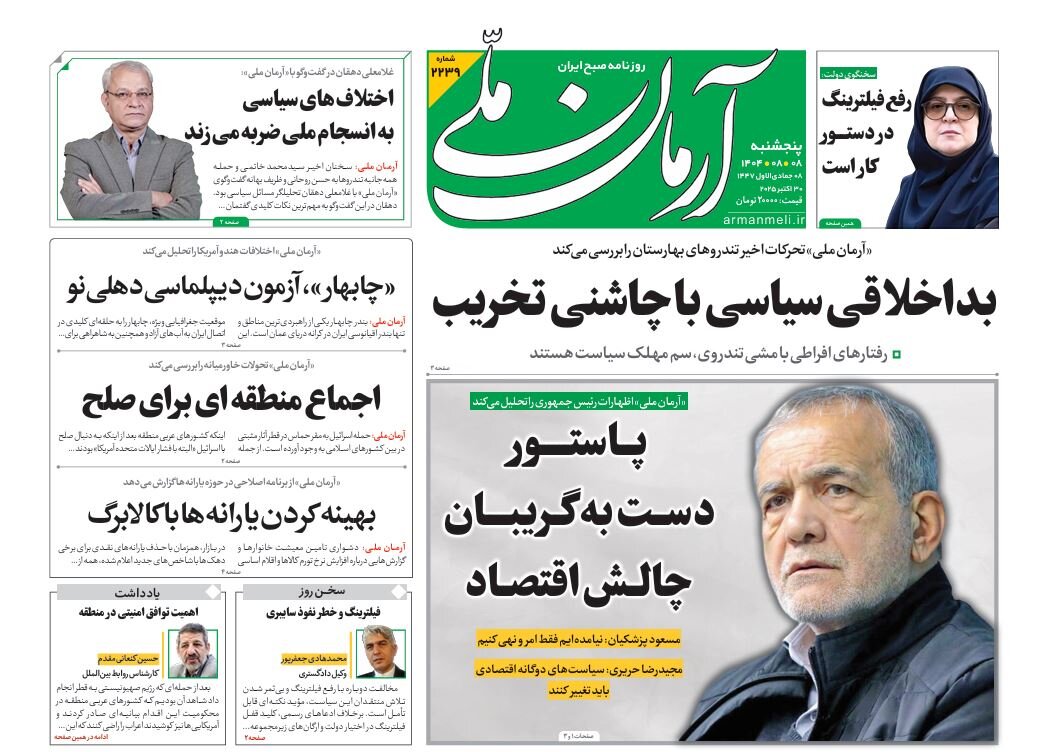Chabahar is a test of Delhi’s diplomacy

TEHRAN - In a recent article, Arman-e-Melli highlighted the strategic importance of Chabahar Port for India. As Iran’s only oceanic port on the shores of the Sea of Oman, Chabahar holds a uniquely strategic position.
This geographic advantage makes it a vital link connecting Iran to international waters and a key transit corridor for goods between Central Asia, the Middle East, and the Indian subcontinent. From Iran’s perspective, Chabahar serves as a crucial gateway for the economic development of its underprivileged southeastern regions, particularly Sistan-Baluchestan Province. The port also offers Iran an opportunity to reduce its reliance on the Strait of Hormuz and diversify its maritime trade routes. Chabahar’s significance extends beyond Iran, drawing keen interest from regional players—especially India and Afghanistan. The port has even become a point of contention between New Delhi and Washington. For India, Chabahar is not merely an economic route but a geopolitical instrument to expand its regional influence and counter China’s Belt and Road Initiative and Gwadar Port, which China has developed in Pakistan.
Khorasan: Agreement or roadmap for development
In a note, Khorasan analyzed the Iran-China 25-Year Comprehensive Cooperation Agreement. The paper argues that this long-term plan encompasses sectors such as energy, infrastructure, technology, industry, and financial and security cooperation. It is a strategic framework that outlines the path of collaboration for the coming decades. The agreement’s flexible structure has enabled Iran to leverage China’s capabilities—as the world’s second-largest economy—in the face of sanctions and global political shifts. To move this agreement from a memorandum of understanding to actual implementation, a national coordinator with cross-sectoral authority and a precise timeline is needed. This individual would be responsible for managing links between ministries, the private sector, and Chinese partners, and for overseeing the execution of projects from negotiation to final delivery. If Iran can harness this partnership through careful management and gradual transparency, one might say the new century could mark the end of Western monopoly in terms of development.
Etemad: A contentious agreement
In a commentary, Etemad examined the recent China–U.S. agreement and its implications for Iran. While the world has yet to recover from the prolonged trade war between the two major economic powers—the United States and China—signs of diplomatic flexibility have begun to emerge in their relations. The recent agreement signals a kind of temporary ceasefire in this economic standoff. In this context, Iran, as a key regional player, faces a duality of opportunity and threat. On one hand, the China–U.S. accord could open new ways for economic cooperation between Tehran and the East. On the other hand, reduced tensions between the two superpowers may narrow Iran’s options for evading sanctions. Under such conditions, Tehran’s natural inclination toward anti-interventionist alliances and cooperation within the “Axis of Resistance” is likely to strengthen. For a country like Iran, this period presents an opportunity to reassess its foreign policy and diversify its exports—from traditional energy sectors to emerging technologies. Ultimately, the fate of the global order lies in the hands of leaders who think beyond national borders and speak the language of justice and cooperation. Perhaps this marks the greatest transformation of our time.
Javan: Strengthening regional cooperation is Iran’s strategic policy
In a commentary on Iran’s hosting of ECO members, Javan emphasized that welcoming the Economic Cooperation Organization (ECO) after 15 years signals a renewed commitment to regional collaboration and a strategic focus on deepening ties with neighboring countries. Amid efforts to counter political and economic pressure from the United States and its European allies, Iran has adopted a policy of active dialogue and diplomacy with regional partners. One of Washington’s key strategies to pressure Tehran has been to isolate Iran within its own region, aiming to encircle it politically. In the midst of Western sanctions and U.S. pressure, the presence of 10 ECO member states at the ministerial summit in Tehran—alongside ministers from neighboring non-member countries—sends a clear and powerful message to the West: “Iran cannot be stopped by sanctions, and the West cannot isolate it through nuclear or human rights pretexts.” Iran shares significant security, economic, and cultural interests with ECO member states, and these commonalities provide a strong foundation for expanding future cooperation.
